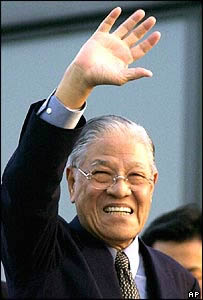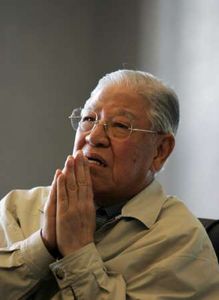|
【人民日報(電子英文版)】China demands Japan correct wrongdoing of allowing Lee Teng-hui’s entry The Chinese government again requests the Japanese government to correct its wrongdoing of permitting Lee Teng-Hui’s tour to Japan, a Foreign Ministry spokesman said Tuesday.Japan reportedly issued tourist visas to Lee Teng-hui, allowing him and his family to visit Nagoya and Kyoto for “sightseeing.” The Japanese government said Lee would not conduct any political activity during his stay in Japan. When asked to comment on this issue at a press conference, spokesman Liu Jianchao said the Japanese government, disregarding the solemn representation and firm opposition from the Chinese government, stubbornly allowed Lee to go to Japan to carry out separatist activities. “The Chinese government expresses strong dissatisfaction and again demands the Japanese side rectify this wrong.” The political aim of Lee’s tour is obviously to find people to back his bid for “Taiwan independence” and create external conditions for his separatism, said Liu, noting Japan clearly knows the point. At a press conference held last Thursday, Liu described Lee as the chief representative of radicals seeking “Taiwan independence.” “The Japanese government’s disregarding Sino-Japanese relations and permitting Lee’s visit to Japan are connivance and support for ‘Taiwan independence’ separatist activity, as well as provocation to China’s peaceful reunification cause,” he said at that conference. Lee, leader of the Taiwan authority from 1988 to 2000, always tried to raise Taiwan’s “international profile” during his 12 years as the leader of the island, and went further and further on the way toward “Taiwan independence.” In 1995, he visited the United States on the pretext of an academic tour, which led to a serious retrogression in Sino-US relations and agitated the tense situation across the Straits. In 1999, before he stepped down, he redefined the island’s ties with the mainland as special “state-to-state” relations. |
|
【Reuters】Japan to Give Taiwan’s Lee Visa Despite China’s Fury Japan said Monday it would issue a visa as scheduled for former Taiwan president Lee Teng-hui to visit for sightseeing despite angry protests from China. Relations between Tokyo and Beijing have already been chilled by a string of disputes, including one over Prime Minister Junichiro Koizumi’s regular visits to Tokyo’s Yasukuni Shrine, where war criminals are honored with other Japanese war dead.”We plan to issue a visa as scheduled,” Chief Cabinet Secretary Hiroyuki Hosoda told reporters. He did not say when the outspoken Lee would receive his visa. Beijing, which sees self-ruled, democratic Taiwan as a renegade Chinese province, has protested to Japan over its decision to let Lee visit and urged Tokyo to scrap the plan. Lee, 81, and his family are expected to arrive in Nagoya in central Japan on Dec. 27 and visit hot springs before leaving for home on Dec. 31, Japanese media said. Hosoda urged media not to follow Lee and report on his trip as the visit was “private” with no political intentions. In Beijing Monday, about 45 furious Chinese shouting slogans and carrying banners gathered outside the Japanese embassy to protest over Lee’s visit. One protester burned a drawing of Koizumi. A spokesman for the group, calling themselves the “Patriotic Alliance,” read aloud a lengthy statement denouncing Japan’s decision and its militarist past. “If the Japanese government doesn’t heed the Chinese government’s warning, and allows Lee Teng-hui to visit Japan, it will cause a fierce reaction,” spokesman Zhang Jianyong told reporters. “The Japanese side is intentionally provoking this issue and causing problems that are none of its business.” A Chinese diplomat urged Tokyo Monday to reverse its visa decision. “It is certain that it (the visa issuance) will have a negative effect on Japan-China ties,” Cheng Yonghua, minister at the Chinese embassy in Tokyo, told reporters. Kyodo news agency quoted Cheng as saying that Lee’s planned visit, if it took place, would become a “new dispute” between the two Asian rivals. “Next year, which marks the 60th anniversary of the end of World War II, is an important and sensitive year to look into the future of Japan-China ties,” he was quoted as saying. Lee tried to raise Taiwan’s diplomatic profile during his 12 years as president, redefining its ties with China in 1999 as “special state-to-state” relations and causing Beijing to break off fence-mending talks which remain suspended to this day. Lee stepped down as president in 2000 and became “spiritual leader” of a new party with an avowed pro-independence stance. He last came to Japan in 2001 for medical treatment, triggering an angry response from Beijing. |
|
【台湾日報①】前總統李登輝將訪問日本,日本李登輝之友會、京都校友會,以及世界台灣同郷會、在日台灣同郷會等僑團都準備前往接機。 世界台灣同郷會副會長林建良預估,可能將有上千人到名古屋機場接機。日本各地僑界都熱烈表示歡迎,並主動準備前往接機。 林建良表示,預估接機人數也會超過千人,這是基本禮貌。日本民主黨衆議員中津川博郷也表示,日本政府此次終於作出英明的決斷,讓身在日本政治第一線的他感到欣慰。 |
|
【台湾日報②】繼20日内閣官房長官細田博之要求日本媒體勿跟隨採訪李登輝之後,町村信孝外相今天也要求國會議員們,勿前去求見李登輝。 小泉純一郎首相21日再度表示,李登輝先生以平民身分想到日本旅遊,日本沒有拒絕的理由,更何況,他還是從日本的大學畢業的。 日本外務大臣町村信孝則於21日出席在民主黨辦的外交部會、調?會等聯合會議時,主動要求國會議員們勿前去求見李登輝。町村表示,「我可以理解議員們想見李登輝先生的心情,但是這次他與家人來日本旅行,希望大家不要前去求見」。 |
|
【台湾日報③】儘管中國強烈抗議,日本外務省今天仍透過台北的日本交流協會發給台灣前總統李登輝訪日簽證,並強調此舉並不影響日本與中國的關係。 諷刺的是,日本政府前一天還罕見的呼喊日本媒體不要報導李登輝訪日的相關事宜,但是日本NHK電視台今天則以頭條新聞方式,大幅報導日本交流協會已核發簽證給台灣前總統李登輝。 外務省發言人千葉明説:「簽證已經發下。」對於核發李登輝簽證是否不利於中日關係,千葉低調看待問題的嚴重性。他並説:「這不表示(日本與台灣)政府之間有交換過意見,因此我們認為這個問題不會產生負面衝突。」外務省一位未具名的官員稍早已證實李前總統已獲日本停留15天的簽證,與其他來自台灣觀光客的待遇並無不同。 日本上周宣布將發給李前總統簽證之後,中國當局曾要求日本重新考慮,以避免兩國之間的緊張關係持續惡化。日本政府則表示,核發簽證並不表示日本支持台獨。81歲的李前總統曾於2001年赴日本接受心臟手術。日本政府表示,李登輝已保證不會在日本從事任何政府活動。 |
|
【台湾日報④】李登輝訪日將有千人接機,日核發15天簽證稱不影響與北京關係日媒體大幅報導外相促議員勿求見李。 李登輝前總統辨公室昨日證實,日本政府已發給李登輝15天的短期單次過境簽證,家人曾文惠女士、李坤儀、張月雲等人,則是為期五年的數次簽。而日方將提供李登輝警力保護的禮遇規格。外交部對日本提供簽證表示歡迎,也強調將提供李登輝訪日的必要協助,包括行政及禮遇通關等事項。 李登輝將此行定位為「回憶之旅」,由於曾在名古屋一帶當過「學徒兵」,此行也將到名古屋、京都等地回憶過往,行程間日方將提供警力保護。 日本外務省昨日核發簽證後,李登輝將於本月27日啟程,展開5天的日本之旅,行程集中在關西、石川縣的金澤、有馬温泉等風景名勝地區。成員還包括家人和醫師團,預計從名古屋機場入境日本,隨後走訪京都、金澤等地,明年1月2日從名古屋機場返台。 |
|
【BBC(英国)】Japan gives visa to Taiwan’s Lee Tokyo insists Mr Lee is visiting as a private citizen and therefore his trip does not violate Japan’s ban on official contacts with Taiwan. But China warned last week that bilateral relations would be harmed if Japan granted the visa.The visa row coincides with a period of tension between China and Japan, who often compete for regional resources. Mr Lee’s visa will allow him to enter Japan once and stay up to 15 days. Japanese Prime Minister Junichiro Koizumi told reporters that Mr Lee was travelling to Japan as a tourist, not a politician, “so there is no reason to turn down his application”. It has been four years since Mr Lee left office, but Beijing makes a point of objecting to other countries giving him access.In Chinese eyes, even the smallest concessions on this issue could shore up Taiwanese dreams of independence, according to the BBC correspondent in Tokyo, Jonathan Head. Inflammatory ‘incursion’ During his 12 years as Taiwanese president, Mr Lee edged the island towards formal independence, infuriating Beijing, which sees Taiwan as a breakaway province. The last time Mr Lee visited Japan was in 2001 for medical treatment. That trip also sparked Chinese anger. Relations between China and Japan have been soured in recent weeks by an alleged incursion by a Chinese submarine into Japanese waters, and a continuing row over repeated visits by Mr Koizumi to the country’s Yasukuni Shrine. The shrine is dedicated to the souls of the country’s war dead, including convicted war criminals, and is viewed by other Asian nations as a symbol of Japanese wartime aggression. |
|
【International Herald Tribune】 Japan issued a tourist visa on Tuesday for former President Lee Teng-hui of Taiwan to visit this month, adding a major irritant to Tokyo’s already-tense relations with Beijing leaders who revile Lee as an agitator for Taiwan’s formal independence. Beijing insists Taiwan is a part of its territory and opposes contact between the self-ruled island’s leaders and other countries – even visits by former leaders. And Lee’s visit would come as ties between Japan and China slide to their lowest level in years. China’s Communist leaders especially despise Lee, whom they accuse of trying to make Taiwan’s de facto independence permanent.”It is hard for us to understand why Japan is giving a favor to someone who slanders and attacks China,” said the Chinese ambassador to Japan, Wang Yi. “This will send a shock through Sino-Japanese relations, which have shown signs of improvement. “Tokyo announced last week that it would issue the visa for Lee. China urged it to reconsider, and renewed its appeal on Tuesday after Japanese Foreign Ministry officials said the visa had been issued.Prime Minister Junichiro Koizumi brushed off concerns about a harsh reaction from China. Referring to Lee, he said: “He wants to travel as a private citizen. So there is no reason to turn down his application. He also graduated from a Japanese university.” China and Japan are feuding over the ownership of islands in the East China Sea, the rights to explore natural gas in the area, and historical accounts of Japan’s invasion of China in the 1930s. Last month, the Japan Navy went on alert after a Chinese submarine was spotted in Japanese waters. Japan lodged a formal complaint, and said later that Beijing had apologized. “We hope that Japan can rectify its incorrect decision,” a Foreign Ministry spokesman, Liu Jianchao, said in Beijing. “It is obvious that Lee Teng-hui harbors political will in his visit to Japan. The spokesman asserted that Lee was “aiming to find backing” in Japan for “his Taiwan splittist activities.” Lee, who stepped down as president of Taiwan in 2000 to become “spiritual leader” of a pro-independence party, tried to raise Taiwan’s diplomatic profile during his 12-year tenure. He redefined the island’s ties with China in 1999 as “special state-to-state” relations, causing Beijing to break off fence-mending talks which remain suspended to this day. Liu urged Tokyo to revoke its decision to issue the visa for Lee. “The Japanese government is acting in this regard against the solemn representations of the Chinese government,” Liu said. “We oppose this and call on the Japanese government to rectify these moves.” But an assistant press secretary at the Japanese Foreign Ministry, Akira Chiba, said, “The visa has been issued,” adding that the document had been issued in Taiwan in the morning. “This does not mean we are having exchanges between governments,” Chiba said. In view of that, he said, the government believed that “this is not the type of matter that will have a negative impact.” But Wang, in a speech to Japanese business leaders, warned that a worsening of Chinese-Japanese political relations could put a damper on thriving economic ties between the two Asian powers. “The economic relations between China and Japan have a bright future and great potential,” he said. “But obstacles involving political relations are clearly having a negative effect on bilateral economic cooperation.” Japan’s top government spokesman, Hiroyuki Hosoda, had said on Thursday that Japan would issue the visa for Lee on the understanding that the former president would not carry out political activities during his stay. Lee and his family are expected to arrive in Nagoya, in central Japan, next Monday and visit hot springs before leaving for home on Jan. 2, Japanese media have said. Hosoda urged news organizations a on Monday not to follow Lee or report on his trip as the visit was “private” with no political intentions. On Tuesday, Hosoda said the government had asked top executives of the governing and opposition parties and politicians with “deep ties” to Taiwan not to meet with Lee. Asked whether it would be “undesirable” for Japanese politicians to meet with Lee, he said, “Absolutely, yes.” In Beijing on Monday, about 45 Chinese shouting slogans and carrying banners gathered outside the Japanese Embassy and protested Lee’s visit. One protester burned a drawing of Koizumi. Lee last came to Japan in 2001 for medical treatment, triggering an angry response from Beijing, which has said it would not rule out using military force to retake Taiwan if it declared formal independence. “Lee Teng-hui, who is a troublemaker, may become a war-maker,” the Chinese ambassador said. |
|
【自由時報①】小泉重申 沒有理由拒發李登輝簽證 日本政府二十一日上午發給台灣前總統李登輝和他的家人到日本旅行的簽證,日本首相小泉純一郎強調説,「李登輝到日本做私人旅行,日本無法拒絕他,更何況他是在日本唸大學」。小泉首相就發給李登輝訪日簽證一事表示,「李登輝以一般平民的身分到日本旅行,日本沒有理由拒絶」。 在這個問題上,外相町村信孝曾在今天的自民黨外交關係合同會議中表示,希望黨籍國會議員能夠自我約束,「不要與李登輝見面」。二○○一年四月李登輝到日本做心臟手術時,當時的保守黨衆議院、現在當環境相的小池百合子曾與李登輝共進早餐,但是當時的内閣官房長官福田康夫曾提出解釋表示,「這並非是政治活動」。 内閣官房長官細田博之也在二十日的記者會中希望媒體記者「自肅」,不要蜂擁採訪李登輝的日本之旅。細田博之的談話被認為是多此一舉,有「管制採訪自由」之嫌,但也有人認為「這是発給中國聽的」,由於這是李登輝在戰後由日本回到台灣以後,第一次前來日本旅行,日本媒體記者放棄採訪這項新聞的可能性很小。 |
|
【自由時報②】日本政府昨天核發前總統李登輝赴日觀光簽證,外交部表示歡迎,駐日代表處將提供李登輝訪日必要協助,包括行政、禮遇及通關等事項。 據了解,李前總統已向友人表示,他這次偕同家人赴日是純觀光活動,並未安排赴醫院做健康檢查。接近李登輝人士並說,外傳李登輝日本此行將做心臟健檢之說並不確實。 近李人士表示,由於中國打壓不斷,李登輝此行十分低調,因此將不會接受媒體專訪;而除了李的幾名隨扈外,日方也將負責保護李的安全。 中國則表達強烈不滿,中國外交部發言人劉建超昨天表示,日本政府不顧中國政府的嚴正交涉和堅決反對,執意允許李登輝赴日「從事分裂國家的活動」,中國政府對此表示強烈不滿。 陸委會官員則表示,李已是一介平民,中共的反應似是「小題大作」,日本政府有什麼理由不同意一位平民到訪?反而是中共姿態太高,日本發簽證是其「內部事務」,中共干涉得太多了。 |
|
【自由時報③】李登輝訪日 將有逾千人接機 前總統李登輝將訪問日本,日本李登輝之友會、京都校友會,以及世界台灣同郷會、在日台灣同郷會等僑團都準備前往接機。世界台灣同郷會副會長林建良預估,可能將有上千人到名古屋機場接機。 李登輝預定於二十七日在家人和醫師團的陪同下訪日一週,將從名古屋機場入境日本,隨後走訪京都、金澤等地,於明年一月二日從名古屋機場返台。李登輝此次訪日純粹想與家人輕鬆度假,因此對外界査訪行程,回應顯得相當低調。然而,日本各地僑界都熱烈表示歡迎,並主動準備前往接機。 林建良表示,僑胞們希望能到機場迎接,這也是基本禮貌,但是他個人不打算打擾李登輝與家人難得的旅遊行程。日本民主黨衆議員、也是「日台安保經濟研究會」會長中津川博郷也向記者表示,日本政府此次終於做出英明的決斷,讓身在日本政治第一線的他感到欣慰。 |
|
【人民日報(電子日文版)①】李登輝氏への訪日ビザ発給に強い不満 外交部報道官 外交部の劉建超報道官は21日の記者会見で、日本政府が台湾の李登輝氏に訪日ビザを発給した問題について、記者からの質問に答えた。――日本政府は21日午前、李登輝氏に訪日ビザを発給した。 報道によると、同国の小泉純一郎首相は、「李登輝氏は一般市民であり、李登輝氏の入国と観光を拒絶する理由はない」としている。 中国はこれをどのように論評するか。 日本政府は中国政府の厳重な申し入れと確固たる反対を顧みず、李登輝氏の訪日による(台湾の)分裂活動を許可することに固執した。中国政府はこれに対して強い不満を表明する。われわれは日本政府にこの過ちを是正するよう再度求めた。李登輝氏の今回の訪日の政治的意図は非常に明確であり、つまり国家を分裂させる活動のために後ろ盾を探し、外部環境を整えることであり、日本側もこのことをはっきりとわかっているはずだ。 |
|
【人民日報(電子日文版)②】日本の中国系住民団体、李登輝氏ビザ発給に抗議 日本在住の中国系住民の団体である日本華僑華人連合総会、東京華僑総会、留日台湾省民会などは21日、それぞれ声明を発表し、国家分裂活動を目的とした李登輝氏の日本訪問を日本政府が認めたことに強く抗議するとともに、日本政府が直ちに李氏への入国ビザ発給を取り消すよう強く求めた。 日本華僑華人連合総会の声明は「周知の通り、李登輝氏は急進的な『台湾独立』勢力の総代表であり、李氏が繰り返し日本訪問を計画する真の目的は、『台湾独立』を支持する後ろ盾を探して、『独立』の歩みを加速させようとすることにある」と指摘する。東京華僑総会と留日台湾省民会は声明で、「日本政府は発言では一つの中国を支持し、『台湾独立』を支持しないと表明するが、実際には李登輝氏が訪日による祖国分裂活動を容認している」と指摘。さらに「日本政府の決定は中日関係を損なうものであり、中国の平和統一という大事業に対する挑戦だ」として、日本政府が直ちに李氏へのビザ発給を取り消すよう求めた。 |
MENU
お知らせ


 Beijing demands Tokyo back down; Koizumi unruffled TOKYO
Beijing demands Tokyo back down; Koizumi unruffled TOKYO